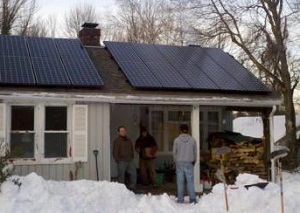Connecticut solar installers frustrated over legislation
 Last year, Connecticut’s legislature and Governor signed bills into to law to boost the amount of solar in the state significantly, including a plan to install 30 megawatts of solar on residential roofs by 2022.
Last year, Connecticut’s legislature and Governor signed bills into to law to boost the amount of solar in the state significantly, including a plan to install 30 megawatts of solar on residential roofs by 2022.
The legislation specified creating long-term incentive programs to support solar.
Now the state’s Clean Energy Finance and Investment Authority (CEFIA) is set to release their first installment, a $7.5 million incentive program that’s set to last up to a year-and-a-half, with future programs to come after that.
However, the short-term nature of the incentive is frustrating solar installers that want long-term stability to help them determine how to move forward with their business plans.
“In a lot of ways it doesn’t matter what the plan is so long as it is a long-range plan,” said Mike Trahan, Solar Connecticut’s executive director. “We’ve had 12-month quick fixes here before, and they don’t work. Our members end up hiring and firing people within a year. We implored the legislature to offer a program that created consistency, they did, and we were overjoyed.”
They also were pleased that the Governor signed the legislation into law.
It’s not that the industry wants the incentives, just stable policy, according to Trahan.
“We’re not huge fans of incentives, but it’s the law of the land in Connecticut,” he said. “We latched on to that, and when it came time for the Department to enact it or create regulations, we thought it would mirror the legislation.”
CEFIA’s staff came up with a policy that mirrored the legislation, Trahan said. But its board came up with the short-term plan and introduced it shortly before they planned to pass it into action.
“When the state give the impression of that [long-term policy] nine months ago, companies flocked to Connecticut and revved up for something major to happen,” he said.
Now there’s just the promise of at least 12 months of funding with the board saying they’ll establish a longer-term approach in six months.
The future may not hold an incentive approach to installing more solar in the state.
“It may very well be that there are other private financing options that are better than straight incentives,” Trahan said.
In fact, Dan Esty, a CEFIA board member and commissioner of the state’s Department of Energy and Environmental Protection, is interested in such market-driven solutions.
Trahan said, going forward, the organization and the agencies will increase their efforts to work together on such policy to ensure all players are happy with the outcome.



